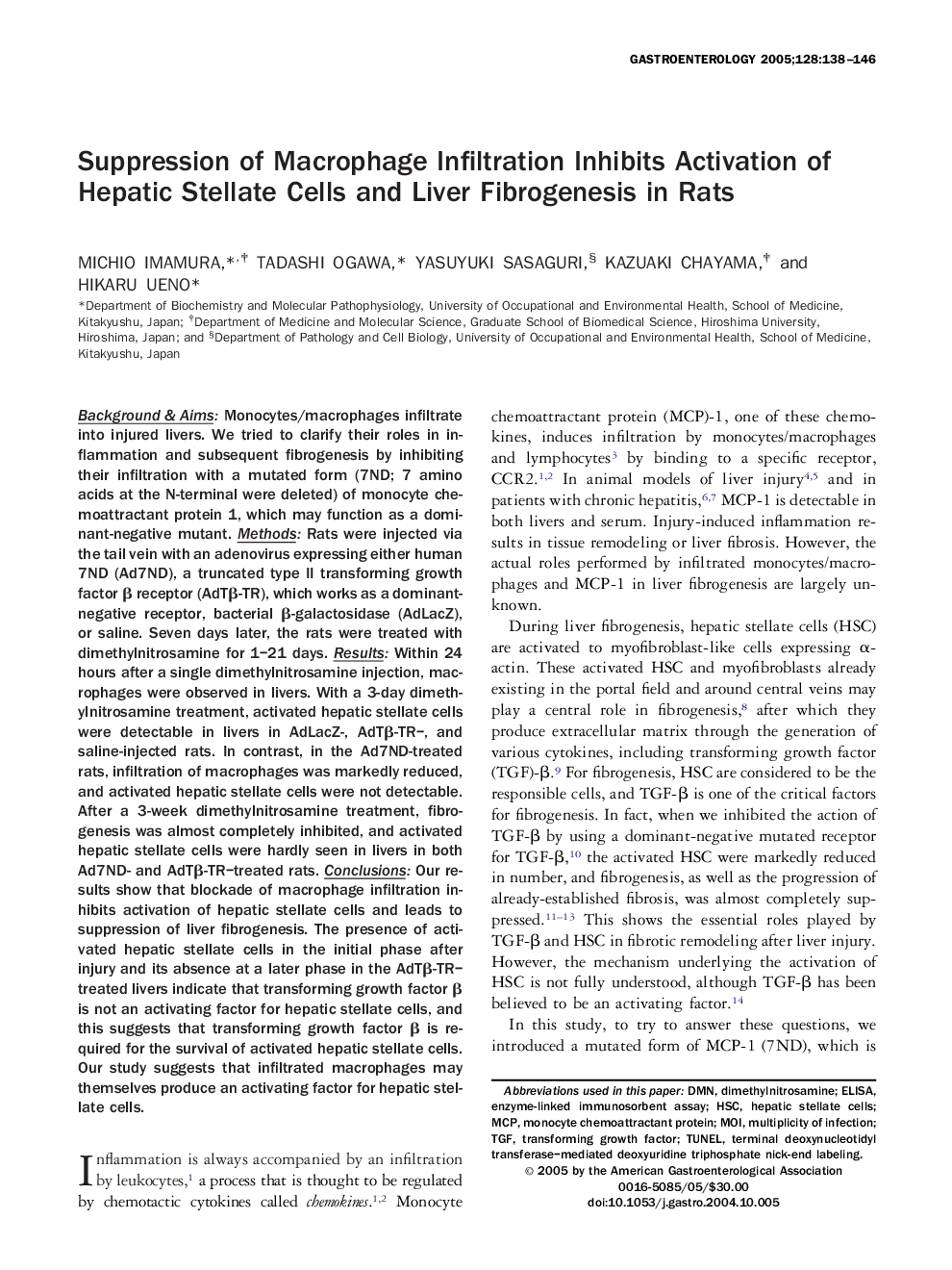| کد مقاله | کد نشریه | سال انتشار | مقاله انگلیسی | نسخه تمام متن |
|---|---|---|---|---|
| 9245931 | 1209958 | 2005 | 9 صفحه PDF | دانلود رایگان |
عنوان انگلیسی مقاله ISI
Suppression of macrophage infiltration inhibits activation of hepatic stellate cells and liver fibrogenesis in rats
دانلود مقاله + سفارش ترجمه
دانلود مقاله ISI انگلیسی
رایگان برای ایرانیان
کلمات کلیدی
HSCMCPDMNTGFdimethylnitrosamineMOI - MEterminal deoxynucleotidyl transferase–mediated deoxyuridine triphosphate nick-end labeling - برچسب ترمودینامیک deoxyuridine triphosphate ترمینال deoxynucleotidyl transferase ترمینالtransforming growth factor - تبدیل فاکتور رشدELISA - تست الیزاEnzyme-linked immunosorbent assay - تست الیزاTUNEL - تونلHepatic stellate cells - سلولهای ستارهای کبدیmonocyte chemoattractant protein - پروتئین شیمیایی monocyte chemoattractantmultiplicity of infection - چندین عفونت
موضوعات مرتبط
علوم پزشکی و سلامت
پزشکی و دندانپزشکی
بیماریهای گوارشی
پیش نمایش صفحه اول مقاله

چکیده انگلیسی
Background & Aims: Monocytes/macrophages infiltrate into injured livers. We tried to clarify their roles in inflammation and subsequent fibrogenesis by inhibiting their infiltration with a mutated form (7ND; 7 amino acids at the N-terminal were deleted) of monocyte chemoattractant protein 1, which may function as a dominant-negative mutant. Methods: Rats were injected via the tail vein with an adenovirus expressing either human 7ND (Ad7ND), a truncated type II transforming growth factor β receptor (AdTβ-TR), which works as a dominant-negative receptor, bacterial β-galactosidase (AdLacZ), or saline. Seven days later, the rats were treated with dimethylnitrosamine for 1-21 days. Results: Within 24 hours after a single dimethylnitrosamine injection, macrophages were observed in livers. With a 3-day dimethylnitrosamine treatment, activated hepatic stellate cells were detectable in livers in AdLacZ-, AdTβ-TR-, and saline-injected rats. In contrast, in the Ad7ND-treated rats, infiltration of macrophages was markedly reduced, and activated hepatic stellate cells were not detectable. After a 3-week dimethylnitrosamine treatment, fibrogenesis was almost completely inhibited, and activated hepatic stellate cells were hardly seen in livers in both Ad7ND- and AdTβ-TR-treated rats. Conclusions: Our results show that blockade of macrophage infiltration inhibits activation of hepatic stellate cells and leads to suppression of liver fibrogenesis. The presence of activated hepatic stellate cells in the initial phase after injury and its absence at a later phase in the AdTβ-TR-treated livers indicate that transforming growth factor β is not an activating factor for hepatic stellate cells, and this suggests that transforming growth factor β is required for the survival of activated hepatic stellate cells. Our study suggests that infiltrated macrophages may themselves produce an activating factor for hepatic stellate cells.
ناشر
Database: Elsevier - ScienceDirect (ساینس دایرکت)
Journal: Gastroenterology - Volume 128, Issue 1, January 2005, Pages 138-146
Journal: Gastroenterology - Volume 128, Issue 1, January 2005, Pages 138-146
نویسندگان
Michio Imamura, Tadashi Ogawa, Yasuyuki Sasaguri, Kazuaki Chayama, Hikaru Ueno,